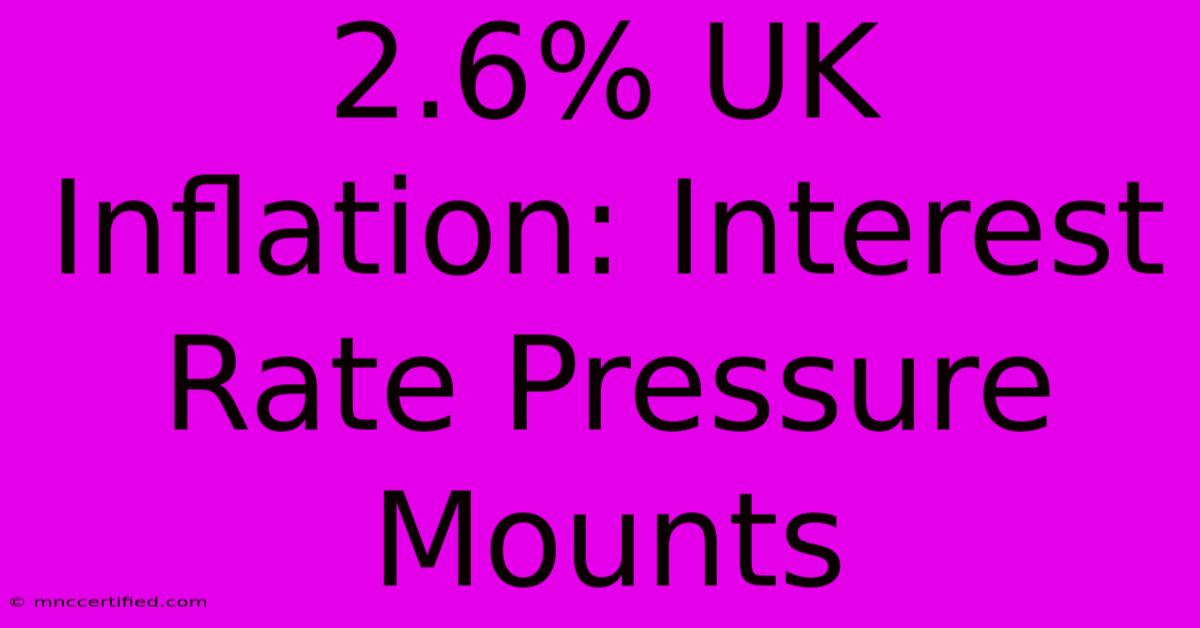2.6% UK Inflation: Interest Rate Pressure Mounts

Table of Contents
2.6% UK Inflation: Interest Rate Pressure Mounts
The UK's inflation rate stubbornly remained at 2.6% in July, fueling speculation that the Bank of England (BoE) will be forced to increase interest rates further to combat persistently high prices. This figure, while slightly lower than June's 2.8%, still sits significantly above the BoE's 2% target, adding pressure on policymakers to act. This article delves into the implications of this persistent inflation and explores the potential consequences of further interest rate hikes.
Understanding the Inflationary Pressure
The persistent inflation in the UK is a complex issue with several contributing factors. While energy prices have eased somewhat compared to last year's surge, underlying inflation, which excludes volatile elements like energy and food, remains stubbornly high. This suggests that inflationary pressures are deeply embedded within the UK economy.
Several key factors contribute to this persistent inflation:
- Wage Growth: Strong wage growth, while positive for workers, adds to inflationary pressures as businesses pass on increased labor costs to consumers through higher prices. This creates a wage-price spiral, a challenging economic cycle to break.
- Supply Chain Disruptions: Although easing, lingering global supply chain issues continue to impact the availability and cost of goods, contributing to price increases.
- Brexit Impacts: The long-term effects of Brexit on the UK economy are still unfolding, with some economists pointing to increased import costs and reduced trade as contributing factors to inflation.
- Global Economic Conditions: Global inflationary pressures, stemming from factors such as the war in Ukraine and lingering pandemic effects, exert upward pressure on UK prices.
Analyzing the Bank of England's Response
The BoE faces a difficult balancing act. Raising interest rates is a traditional tool to combat inflation, as higher rates make borrowing more expensive, thus reducing consumer spending and cooling down the economy. However, aggressive rate hikes risk triggering a recession, slowing economic growth and potentially leading to job losses.
The BoE's Monetary Policy Committee (MPC) is carefully monitoring economic indicators to determine the appropriate course of action. The continued inflation at 2.6% will likely increase the pressure on the MPC to enact another interest rate rise at their next meeting, despite the risks involved.
The Potential Consequences of Further Interest Rate Hikes
Further interest rate increases could have several significant consequences for the UK economy:
- Higher Mortgage Rates: Rising interest rates directly impact mortgage repayments, making it more expensive for homeowners and potentially cooling the housing market.
- Reduced Consumer Spending: Higher borrowing costs can lead to reduced consumer spending, impacting businesses and economic growth.
- Increased Unemployment: A slowing economy due to higher interest rates could result in job losses.
- Currency Fluctuations: Changes in interest rates can influence the value of the pound sterling, impacting imports and exports.
Alternative Approaches and Mitigation Strategies
While interest rate hikes remain the primary tool, the BoE may also consider alternative approaches to manage inflation:
- Targeted Fiscal Policy: The government could implement fiscal measures to directly address specific inflationary pressures, such as subsidies for energy or targeted tax breaks.
- Supply-Side Reforms: Addressing underlying supply chain bottlenecks and structural issues within the economy could help ease inflationary pressures in the long term.
Conclusion: Navigating Uncertain Economic Waters
The UK's persistent inflation at 2.6% presents a significant economic challenge. While the Bank of England is likely to continue raising interest rates to combat inflation, the potential negative consequences of such action necessitate a careful and measured approach. The coming months will be crucial in determining how the UK navigates these uncertain economic waters and manages the delicate balance between controlling inflation and avoiding a recession. Continued monitoring of economic indicators and proactive policy responses will be vital to mitigate the potential risks and foster a sustainable economic recovery.
Keywords: UK inflation, interest rates, Bank of England, inflation rate, monetary policy, economic growth, recession, mortgage rates, consumer spending, wage growth, supply chain, Brexit, global economy, MPC, wage-price spiral.

Thank you for visiting our website wich cover about 2.6% UK Inflation: Interest Rate Pressure Mounts. We hope the information provided has been useful to you. Feel free to contact us if you have any questions or need further assistance. See you next time and dont miss to bookmark.
Featured Posts
-
Pilots Adjustments Safe Landing
Dec 18, 2024
-
Radio Host Saves Dog River Thames
Dec 18, 2024
-
Memphis West Virginia Game Highlights
Dec 18, 2024
-
Ex Wifes Post Nba Message On Timma
Dec 18, 2024
-
Real Madrid Vs Pachuca 2024 Club Cup Matchup
Dec 18, 2024